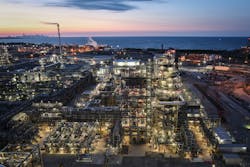BP announced late last year that it completed commissioning of the last piece of its multi-year, multi-billion-dollar refinery modernization project in Whiting, Ind. Today, Emerson Process Management says it has completed process automation for the facility. As main automation contractor (MAC) for the massive upgrade, Emerson provided technologies and services that helped enable the Chicago-area refinery to modernize its facility to process advantaged crude supplies.
“The Whiting project is one of the largest, most complex startups for which we’ve served as main automation contractor,” noted Steve Sonnenberg, president of Emerson Process Management.
The massive expansion of BP’s heavy-sour crude production comes at a time when average crude oil worldwide is getting heavier, causing refineries to change their refining processes, according to Doug White, director of refining industry solutions for Emerson Process Management, who spoke about the refinery market during the recent opening of the Emerson Innovation Center in Round Rock, Texas. BP’s Whiting facility is in the highly profitable Midwest region, where there is a “very substantial amount of cheap crude,” White noted.
As announced in December, BP expects the refinery to ramp up progressively higher Canadian crude processing through the first quarter of this year. “The Whiting Refinery project has been at the heart of our U.S. fuels strategy to operate sophisticated, feedstock-advantaged refineries tied to strong logistics and integrated into fuels marketing,” said Iain Conn, chief executive of BP’s downstream segment, in the company’s December statement. “This world-class refinery is in the right location with the right equipment to process growing supplies of North American crude oil, including heavy grades from Canada.”
To facilitate commissioning and startup of BP’s new crude distillation unit, coking unit, gas oil hydrotreater and sulfur complex units, Emerson drew on the resources of its engineering centers around the world, including more than 80 engineers, consultants and technical specialists from the U.S., India, Costa Rica and the Philippines.

